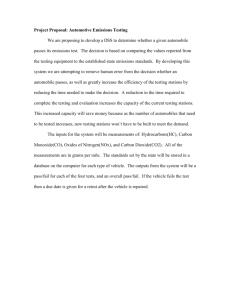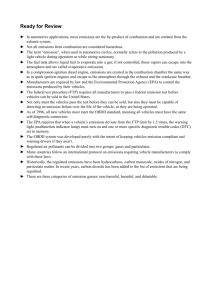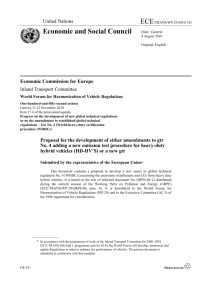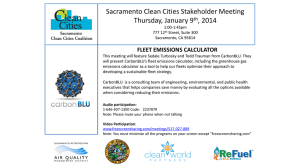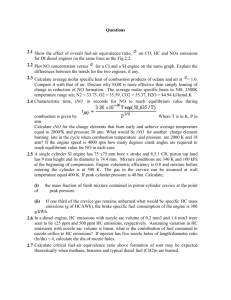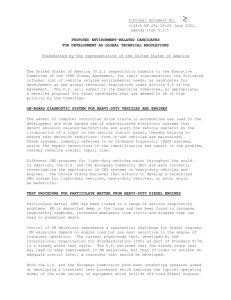Speaker Bios - The International Council on Clean Transportation
advertisement
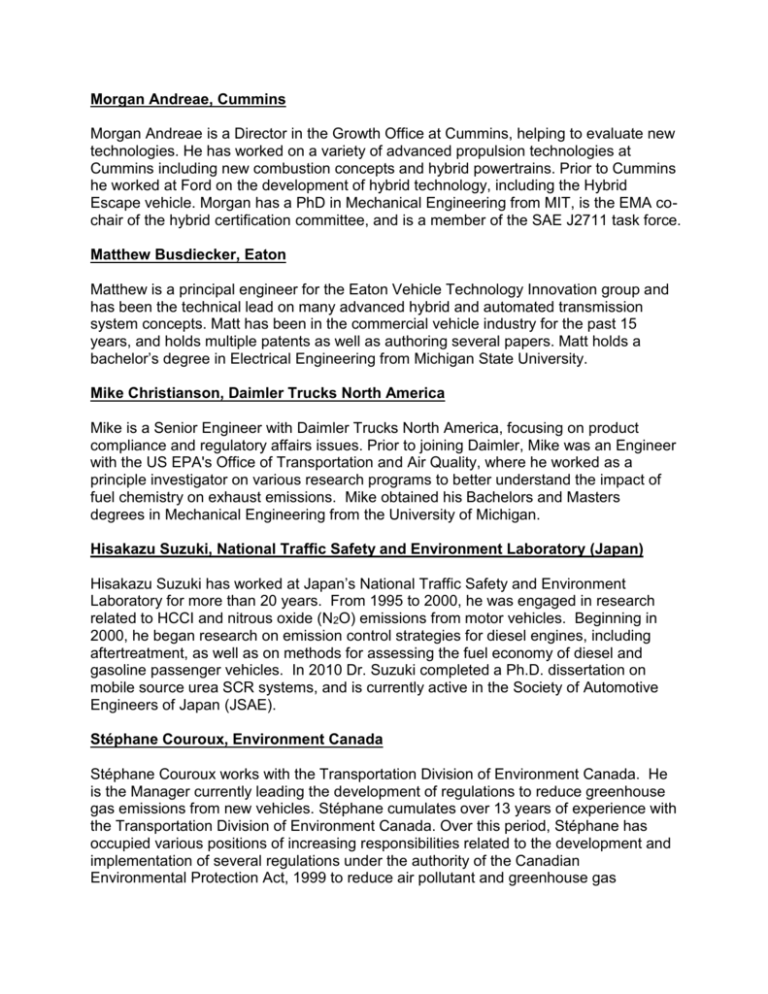
Morgan Andreae, Cummins Morgan Andreae is a Director in the Growth Office at Cummins, helping to evaluate new technologies. He has worked on a variety of advanced propulsion technologies at Cummins including new combustion concepts and hybrid powertrains. Prior to Cummins he worked at Ford on the development of hybrid technology, including the Hybrid Escape vehicle. Morgan has a PhD in Mechanical Engineering from MIT, is the EMA cochair of the hybrid certification committee, and is a member of the SAE J2711 task force. Matthew Busdiecker, Eaton Matthew is a principal engineer for the Eaton Vehicle Technology Innovation group and has been the technical lead on many advanced hybrid and automated transmission system concepts. Matt has been in the commercial vehicle industry for the past 15 years, and holds multiple patents as well as authoring several papers. Matt holds a bachelor’s degree in Electrical Engineering from Michigan State University. Mike Christianson, Daimler Trucks North America Mike is a Senior Engineer with Daimler Trucks North America, focusing on product compliance and regulatory affairs issues. Prior to joining Daimler, Mike was an Engineer with the US EPA's Office of Transportation and Air Quality, where he worked as a principle investigator on various research programs to better understand the impact of fuel chemistry on exhaust emissions. Mike obtained his Bachelors and Masters degrees in Mechanical Engineering from the University of Michigan. Hisakazu Suzuki, National Traffic Safety and Environment Laboratory (Japan) Hisakazu Suzuki has worked at Japan’s National Traffic Safety and Environment Laboratory for more than 20 years. From 1995 to 2000, he was engaged in research related to HCCI and nitrous oxide (N2O) emissions from motor vehicles. Beginning in 2000, he began research on emission control strategies for diesel engines, including aftertreatment, as well as on methods for assessing the fuel economy of diesel and gasoline passenger vehicles. In 2010 Dr. Suzuki completed a Ph.D. dissertation on mobile source urea SCR systems, and is currently active in the Society of Automotive Engineers of Japan (JSAE). Stéphane Couroux, Environment Canada Stéphane Couroux works with the Transportation Division of Environment Canada. He is the Manager currently leading the development of regulations to reduce greenhouse gas emissions from new vehicles. Stéphane cumulates over 13 years of experience with the Transportation Division of Environment Canada. Over this period, Stéphane has occupied various positions of increasing responsibilities related to the development and implementation of several regulations under the authority of the Canadian Environmental Protection Act, 1999 to reduce air pollutant and greenhouse gas emissions from vehicles and engines, including: On Road-Vehicle and Engine Emission Regulations; Off-Road Small Spark-Ignition Engine Emission Regulations; Off-Road Compression-Ignition Engine Emission Regulations; Marine Spark-Ignition Engine, Vessel and Off-Road Recreational Vehicle Emission Regulations; Passenger Automobile and Light Truck Greenhouse Gas Emission Regulations; and, Heavy-Duty Vehicle and Engine Greenhouse Gas Emission Regulations. Giorgos Fontaras (Consultant for the JRC) Dr. Georgios Fontaras is a mechanical engineer holding a PhD in mechanical and automotive engineering. He has worked for eight years as a researcher at the Lab of Applied Thermodynamics of the Aristotle University performing a wide range of activities on fuel consumption reduction technologies, fuels and biofuels and policy analysis. Since 2010 he is working for the European Commission’s Joint Research Center initially as researcher and currently as a consultant. His work is related to vehicle energy efficiency analysis and modeling, monitoring CO2 emissions from Light and Heavy Duty Vehicles, vehicle testing and policy analysis. He has authored and co-authored more than 25 peer reviewed publications in these fields. James Sanchez, U.S. Environmental Protection Agency James Sanchez is an Engineer in the Assessments and Standards Division of the Office of Transportation and Air Quality of the United States Environmental Protection Agency (EPA). Mr. Sanchez has been at the EPA since 2005. Over that time he has played a significant role in finalizing some of the EPA’s main air pollution regulations, which have been projected to save thousands of lives annually. James led the development of the EPA’s first test procedure for measuring heavy-duty (HD) powertrain emissions and fuel economy. Mr. Sanchez has also led test programs to prove the feasibility of using heavy-duty highway engine emission control devices on locomotive engines. Currently, James is focusing his time on developing the EPA’s regulations to reduce GHG emissions for both HD and light-duty vehicles. Nigel Clark, West Virginia University Nigel Clark is the George B. Berry Chair of Engineering at West Virginia University and associate vice president for academic strategic planning. Nigel is also a member of the National Academy of Sciences committee that was recently reconvened to continue the work done in 2010 to assess technologies and strategies for increasing the efficiency of heavy-duty vehicles. Nigel has extensive experience in vehicle design, advanced vehicle concepts, alternative fuels and the measurement and reduction of vehicle emissions. He has conducted research for government and industry in the areas of fuel economy and emissions from heavy-duty vehicles, including buses and heavy hybrid drive vehicles, and works with the International Council for Clean Transportation on technology and efficiency review. Bernardo Martinez, European Commission (DG Enterprise) Bernardo Martinez is a Legislative officer at the Directorate General for Enterprise and Industry (DG Enterprise) at the European Commission. He is responsible for developing legislation on emissions from the transport sector. In addition, he helps facilitate the implementation of actions and policy measures for electric vehicles. He holds a Masters of Engineering degree from ICAI School of Engineering (Escuela Técnica Superior de Ingeniería). Tony Greszler, Volvo Trucks North America Mr. Greszler has been involved with diesel engine and commercial vehicle development since 1977, with experience in all aspects of engine and powertrain design and development, including heavy-duty diesel and natural gas engines and other alternative fuels. He is also working on overall road freight efficiency through integrated complete vehicle development and mitigation of greenhouse gas emissions associated with road freight. From 1977-2001 he was with Cummins Engine Co. responsible for design and development of heavy-duty diesel engines, including on-highway and off-highway applications. In 2001, he became Vice President, Engineering for Volvo Powertrain, North America, a division of AB Volvo, with responsibility for engine development for Mack Trucks and Volvo Trucks North America, including US 2007 and 2010 emissions. In 2005, he took responsibility for Advanced Engineering for Engines and Vehicle Propulsion with focus on diesel combustion/emissions, hybrid propulsion, advanced transmissions, and alternative fuels. Currently, he is Vice President Government and Industry Relations focusing on fuel savings and CO2 mitigation from road freight transport and heavy-duty vehicle regulations. Other activities include serving as an officer and current chair of the Truck and Engine Manufacturers Association, memberTransportation Research Board Special Task Force on Climate Change and Energy, and National Academy of Science “Committee for Potential Energy Savings and Green House Gas Reduction from Transportation”. He has been a speaker at numerous conferences related to diesel engine and freight efficiency and has testified in the House Committee on Science and Technology relative to commercial vehicle technology programs.

